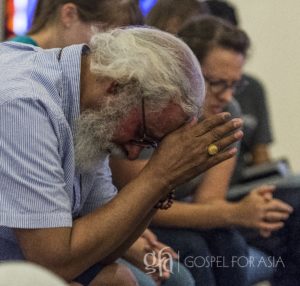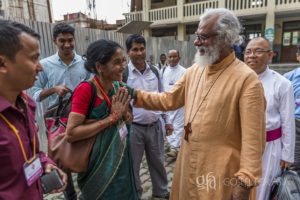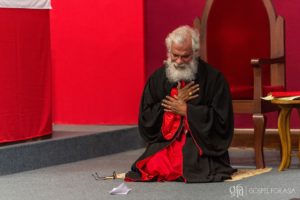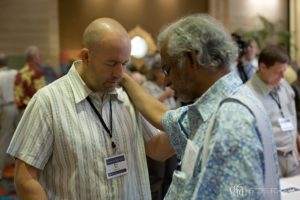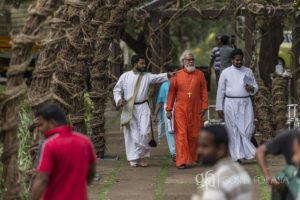I stood one day at a busy Bombay street corner, waiting for the light to change, and I heard the voice of a young girl behind me.
“Sir,” she said, “my father is dead. My mother is sick and can’t beg anymore. I have a little brother, and he is very hungry. Would you please give me a few pennies so I can buy him some bread?”
Her words pierced my heart.
The light turned green. The crowd around me surged forward across the street, but I turned around to see who was speaking to me.
There she stood in rags, dirt under her fingernails and dust and sweat mingled on her face-one of the most beautiful little girls I had ever seen. Her big brown eyes were set in a small round face, and thick black hair fell the length of her body.
I dug into my pockets for all the change I could give her, and then I walked away weeping. The Lord spoke to my heart just then: “What do you think about that little beggar girl you just met?” He asked. “Is her life as dear to you as your own daughter’s?”
The Lord stopped me in my tracks that day in Bombay, and He taught me how precious children are to His heart.
How Do We Respond?
If we desire that God not only bless our lives but make us a blessing to others as well, our hearts must remain open to what concerns Him: the spiritually lost, the downtrodden of society, the poor and needy.
Today we are face to face with the child laborers of Asia, the street children roaming the cities, the tsunami orphans, the boys and girls who go hungry every night. How do we respond to these children who have been cast aside by society, trampled underfoot, ignored and traumatized?
Their need is staggering, beyond our scope of comprehension. Our resources are abundant and overflowing. We often sense the urge to take action simply out of obligation.
But Jesus plainly tells us that our response should begin with Him: “Whoever receives one of these little children in My name receives Me” (Mark 9:37). In essence, He says, “Reach out to these boys and girls, make room for them in your hearts, care for them and embrace them. Welcome them as if you were welcoming Me.”
Do you see how this changes our whole perspective? Now our prayers and gifts on behalf of these children become our highest privilege, for when we welcome these children, we gladly welcome Jesus Himself into our hearts and homes.
A Joyful Surprise
But this is only the beginning. This guiding principle is at the very core of our Bridge of Hope program. As we educate thousands of Dalit, low-caste and displaced children, we care for them as we would Jesus Himself. And in the process, we have been joyfully surprised.
As these boys and girls hear about Jesus and at the same time experience His love and compassion in a tangible way, they are finding Him as Lord and Savior. Parents wonder at the changes in their children’s behavior. Community leaders marvel to see literacy rates rise. Families and villages are impacted with the Gospel.
Where GFA missionaries were previously opposed, persecuted or run out of town, they are now gladly trusted and accepted. Gospel workers are seeing the Good News spread more quickly than they ever expected in areas completely devoid of any Christian witness. Flourishing churches with 100 or more members have sprung up in about a year, instead of the three or four years it would normally take to attain this growth in unreached communities.
God never despises small beginnings, and He will never walk away from a little child. When we share His heart and minister to these little ones, we make a twofold discovery: In welcoming Jesus and making it our privilege to touch the lives of children with His love, we also join with Him as He opens a way for the Gospel into villages and hearts once staunchly resistant. Thus, our highest privilege is also the answer to their deepest need-and it becomes our joy to share in the eternal fruit that results.
To learn more about GFA Bridge of Hope, or to sponsor a child, click here.


